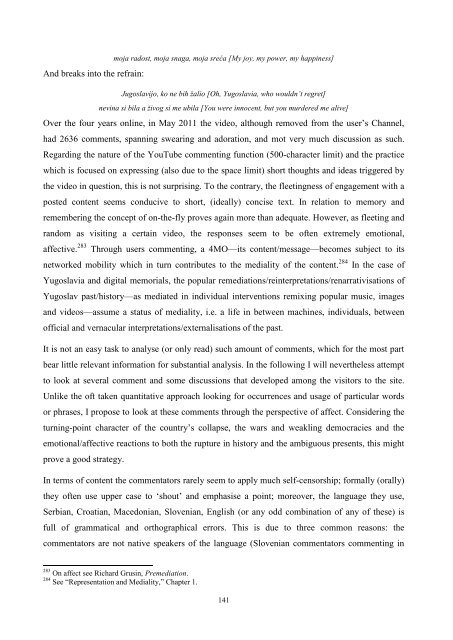UNIVERSITY OF NOVA GORICA GRADUATE SCHOOL ...
UNIVERSITY OF NOVA GORICA GRADUATE SCHOOL ...
UNIVERSITY OF NOVA GORICA GRADUATE SCHOOL ...
You also want an ePaper? Increase the reach of your titles
YUMPU automatically turns print PDFs into web optimized ePapers that Google loves.
And breaks into the refrain:<br />
moja radost, moja snaga, moja sreća [My joy, my power, my happiness]<br />
Jugoslavijo, ko ne bih žalio [Oh, Yugoslavia, who wouldn‘t regret]<br />
nevina si bila a živog si me ubila [You were innocent, but you murdered me alive]<br />
Over the four years online, in May 2011 the video, although removed from the user‘s Channel,<br />
had 2636 comments, spanning swearing and adoration, and mot very much discussion as such.<br />
Regarding the nature of the YouTube commenting function (500-character limit) and the practice<br />
which is focused on expressing (also due to the space limit) short thoughts and ideas triggered by<br />
the video in question, this is not surprising. To the contrary, the fleetingness of engagement with a<br />
posted content seems conducive to short, (ideally) concise text. In relation to memory and<br />
remembering the concept of on-the-fly proves again more than adequate. However, as fleeting and<br />
random as visiting a certain video, the responses seem to be often extremely emotional,<br />
affective. 283 Through users commenting, a 4MO—its content/message—becomes subject to its<br />
networked mobility which in turn contributes to the mediality of the content. 284 In the case of<br />
Yugoslavia and digital memorials, the popular remediations/reinterpretations/renarrativisations of<br />
Yugoslav past/history—as mediated in individual interventions remixing popular music, images<br />
and videos—assume a status of mediality, i.e. a life in between machines, individuals, between<br />
official and vernacular interpretations/externalisations of the past.<br />
It is not an easy task to analyse (or only read) such amount of comments, which for the most part<br />
bear little relevant information for substantial analysis. In the following I will nevertheless attempt<br />
to look at several comment and some discussions that developed among the visitors to the site.<br />
Unlike the oft taken quantitative approach looking for occurrences and usage of particular words<br />
or phrases, I propose to look at these comments through the perspective of affect. Considering the<br />
turning-point character of the country‘s collapse, the wars and weakling democracies and the<br />
emotional/affective reactions to both the rupture in history and the ambiguous presents, this might<br />
prove a good strategy.<br />
In terms of content the commentators rarely seem to apply much self-censorship; formally (orally)<br />
they often use upper case to ‗shout‘ and emphasise a point; moreover, the language they use,<br />
Serbian, Croatian, Macedonian, Slovenian, English (or any odd combination of any of these) is<br />
full of grammatical and orthographical errors. This is due to three common reasons: the<br />
commentators are not native speakers of the language (Slovenian commentators commenting in<br />
283 On affect see Richard Grusin, Premediation.<br />
284 See ―Representation and Mediality,‖ Chapter 1.<br />
141

















